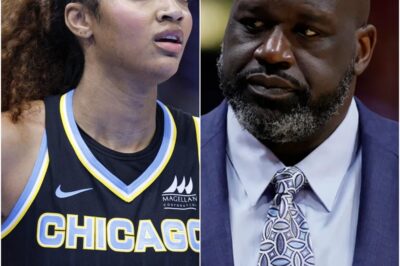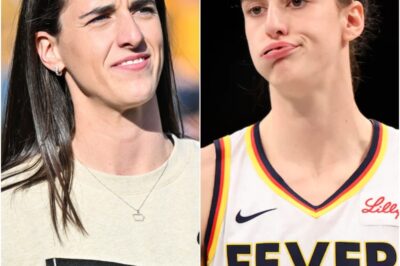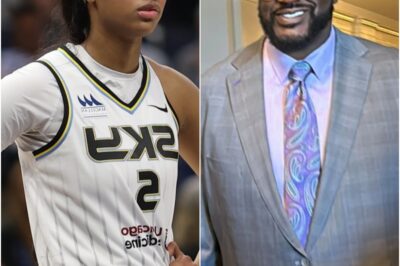In the fast-paced, highly competitive world of the WNBA, rivalries are often born on the hardwood, forged in the fire of intense matchups and high-stakes playoff battles. But what happens when that rivalry spills off the court and into the public eye, fueled by a star player’s unfiltered and controversial remarks? The answer, as the basketball world is currently discovering, is a firestorm of debate, speculation, and fierce division. This is the story of how a single podcast interview from Indiana Fever guard Sophie Cunningham has detonated a bombshell of accusations, challenging the very foundation of fairness in professional women’s basketball and putting the league’s officiating squarely under the microscope.
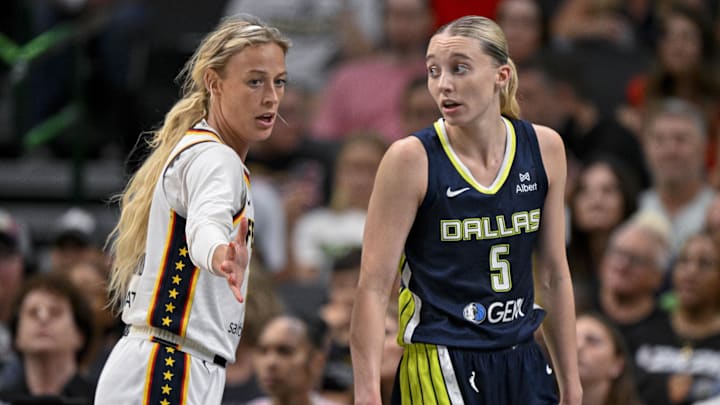
The controversy centers on a recent episode of the popular podcast “Show Me Something,” where Cunningham appeared as a guest. The conversation, which initially focused on the Fever’s tough season, took a sharp turn when the topic of a recent game against the Dallas Wings came up. The Fever had lost a nail-biter, a tight 81-80 contest, and the absence of their superstar teammate, Caitlin Clark, due to injury was keenly felt. Cunningham, a player known for her candidness and competitive spirit, didn’t hold back. She didn’t mince words, she didn’t offer a polite critique—she went straight for the heart of the matter, leveling a direct and stunning accusation.
Her target was not a teammate or an opponent’s strategy, but rather the officiating itself, and specifically, the treatment of one of the league’s most exciting young talents: Paige Bueckers. Cunningham, in a quote that has now gone viral, declared, “I love Paige to death, do not get me wrong. I think she’s a hell of a player and would love to play with her one day, but those refs were giving her every freaking whistle last night.” She continued, her frustration evident in her voice, describing how it felt like “you literally couldn’t touch her,” a phenomenon she found “so annoying.” These weren’t the polite, measured words of a player in a post-game press conference; they were the raw, honest frustrations of an athlete who felt the playing field was anything but level.
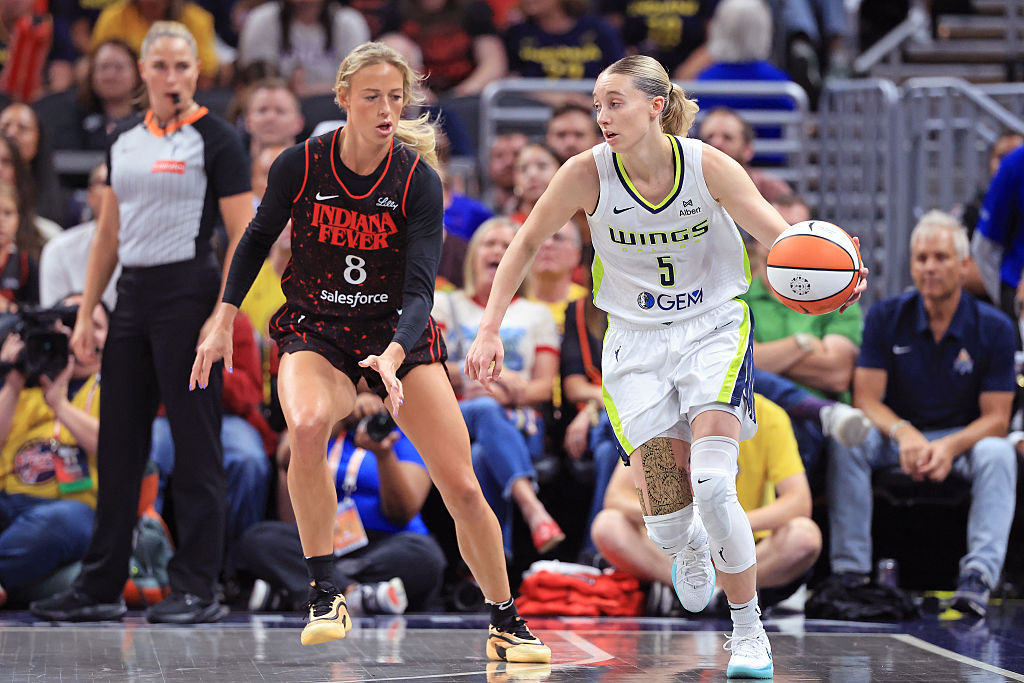
The timing of Cunningham’s comments is critical. The game in question was a hard-fought contest where both she and her teammate, Lexie Hull, were tasked with guarding Bueckers. Without Clark on the floor to draw attention and space the court, the Fever’s defense was stretched thin, and the officiating, according to Cunningham, seemed to compound their difficulties. She painted a picture of a game where a single player was granted special immunity from the physical contact that is a normal, accepted part of basketball. This wasn’t just a critique; it was a public declaration of a perceived double standard, a claim that some players are simply treated differently by the officials.
Cunningham’s allegations have struck a chord with a significant portion of the WNBA fan base. For years, there has been an undercurrent of speculation and debate about favoritism in officiating. Fans have long argued about whether certain star players receive more favorable calls, whether it’s due to their star power, their team’s reputation, or simply the narrative surrounding their careers. Cunningham’s comments, however, have moved this conversation out of the realm of speculation and into the public discourse with an undeniable force. Her candidness has given voice to a frustration that many fans and even other players may have felt, but were hesitant to express.
The fallout has been immediate and widespread. Social media platforms, particularly Facebook, have become a battleground for a heated debate. One side defends Cunningham, applauding her for her courage to speak the truth and calling for a league investigation into the officiating. They argue that her comments are not about Paige Bueckers as a person or a player, but about the systemic issue of favoritism that can undermine the integrity of the sport. On the other side, there are those who have accused Cunningham of sour grapes, of lashing out after a tough loss, and of disrespecting a fellow athlete. They point to the fact that Bueckers is an exceptional talent, and her ability to draw fouls is a testament to her skill, not a symptom of unfair officiating.
This controversy also raises important questions about the role of star power and media narratives in modern sports. In an era where players like Caitlin Clark and Paige Bueckers are becoming household names, attracting unprecedented attention and new fans to the league, the spotlight on them is more intense than ever. Every play, every foul, and every referee’s whistle is now analyzed with a level of scrutiny that was once unimaginable. Cunningham’s comments suggest that this star power may be inadvertently influencing the game itself, creating an uneven playing field where the officials, consciously or not, are swayed by the gravity of a player’s reputation.
Ultimately, the firestorm ignited by Sophie Cunningham’s words is about more than just a single game or a specific foul. It’s about the deep-seated questions that have long simmered just beneath the surface of the WNBA. It’s about fairness, integrity, and the delicate balance between competitive passion and sportsmanship. The league now faces a difficult challenge: to address these allegations head-on, to reassure fans and players that the game is officiated fairly, and to navigate the complex dynamics of a league that is growing in popularity and influence. While some may see Cunningham’s comments as a reckless act, others will see it as a necessary wake-up call—a moment that forced the WNBA to confront a conversation it may have been trying to avoid. And as the debate rages on, one thing is certain: the conversation about favoritism in the league has just become a lot louder.
News
VIDEO: NBA 2K26 Just Paired Angel Reese With Shaq And Social Media Has Gone Completely Off The Rails
Shaq and Angel Reese in NBA 2K26 (Photo via Twitter) With less than a month left before the official…
SH0CKING: NBA Legend Bob Cousy Breaks 9 Months Of Silence With 1 Chilling Line About Caitlin Clark That Had The Network Cut To Commercial
He walked into the ESPN studio slowly, cane in one hand, a folded notecard in the other. Bob Cousy —…
Chicago Med Season 10 Has Fans Fired Up With Three New Doctors Two Broken Hearts And One Epic Showdown That Could Shake The Hospital To Its Core
Chicago Med: More Drama, More Trauma, More Gaffney! Good news, Chicago Med fans! NBC has given us the green light…
First Look At FBI Season 8 Has Fans Buzzing As Beloved Duo Returns To Take On A Jaw Dropping New Case That Could Change Everything
As the FBI franchise continues to evolve, the spotlight now shines on its flagship show, which is gearing up for an action-packed…
High Potential Season 2 Blows Up Morgan’s World As Roman Returns And Fans Are Losing It Over The Chaos Betrayal And Shocking Twists Unfolding In Los Angeles
The world of High Potential is no stranger to danger, secrets, and unexpected betrayals. Yet, as the highly anticipated Season 2 unfolds,…
This Rising Sports Star Was Set To Lead A Brand’s $Million Comeback — Now Viral Mockery Has Put The Entire Deal In Jeopardy
In the world of sports marketing, some partnerships feel destined for greatness. When Angel Reese, the fiery and charismatic star…
End of content
No more pages to load

